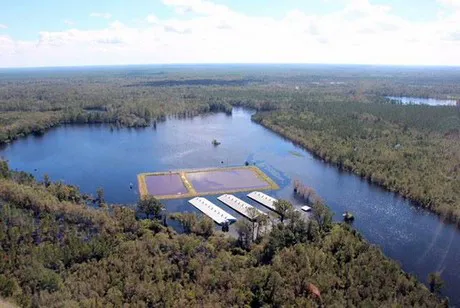The sun is finally out in North Carolina, but the ground is still very wet as the state slowly starts to recover from ex-Hurricane Florence. Many sweet potato fields are still underwater, and growers have not have not had a chance to formally assess fields. The general consensus is that there will be damage to sweet potato crops, but the extent is still to be determined. The real determination will come when harvest resumes - whenever that is - and growers begin digging up their crop.
"At this time, we still do not know the amount of water damage the crop has endured, if any," said Regan Boyette of Boyette Brothers Produce in Wilson, North Carolina. "It is not going to be until we start trying to get back in the field next week and beginning plowing these up for harvest will we know what effects Florence has had on this crop."

Image: N.C. Department of Agriculture and Consumer Services
Some fields are now dry
George Wooten of Wayne E. Bailey Produce, said his fields are now dry and accessible. His fields are located in the far south of the state, close to the border with South Carolina. This area received the most direct impact and rainfall totals were very high. But Wooten said that before Florence, the region had not experienced any rainfall for weeks and many of the local reservoirs were running dry.
"We had not had any rain for the four weeks prior to Florence," Wooten recalled. "There was a lack of water, all the swamps and dams were dry and the crops were beginning to suffer. The storm was very slow moving and we received between 13" and 15" of rain. However, all that water ran off and the fields are now dry. Also, we are fortunate to have fall weather around this week and temperatures are not very high. It would have been worse had summer-like temperatures returned directly after the storm. This would have caused a lot of damage to the fields."
Wooten is positive and said they are hoping to resume harvesting as soon as possible. The company's pack house has been operational since Monday. "The rain had stopped in our area by Sunday night and we even did some packing on Monday," he shared. "We're pretty sure there will be damage but not quite as much as first feared. I've walked over the beds and they have felt firm. If they're waterlogged, your feet will sink down 6" - 8". We hope to get back into the fields next week and resume harvest where we can also properly assess for any losses."

Interstate 40. Image: N.C. Department of Agriculture and Consumer Services
Kelly McIver of the North Carolina SweetPotato Commission, also made a statement, saying that sweet potatoes are resilient and growers overall remain positive. “North Carolina sweet potatoes are a resilient crop," she said. In fact, Covington, one of the most popular varieties of North Carolina sweet potatoes, have proven to be fairly weather tolerant. We remain hopeful for the best.”
Transportation and community infrastructure the main challenges
Aside from the rain and flooded fields, the most immediate problems are associated with transportation and getting trucks in and out, not just to the crops, but also to local communities. Portions of Interstate 95 as well as Interstate 74 between Wilmington and Charlotte remain closed. Many local roads are also still flooded.
"The main challenge for us is that we can't get trucks in and out," Wooten said. "This part of the state is surrounded by rivers and we have used all kinds of apps to work out road closures and so forth. Overall, the real hurt is in the communities. There are a lot of flooded roads and damage is present in many of the towns. Right now, we are focusing on helping our neighbors, especially those close the rivers."
For more information:
Regan Boyette
Boyette Brothers Produce
Tel: +1 (252) 206-0737
[email protected]
www.boyettebrothersproduce.com
George Wooten
Wayne E. Bailey Produce Company
Tel: +1 (910) 654-5163
[email protected]
www.sweetpotatoes.com
Kelly McIver
North Carolina SweetPotato Commission
Tel: +1 (919) 894-1067
www.ncsweetpotatoes.com
